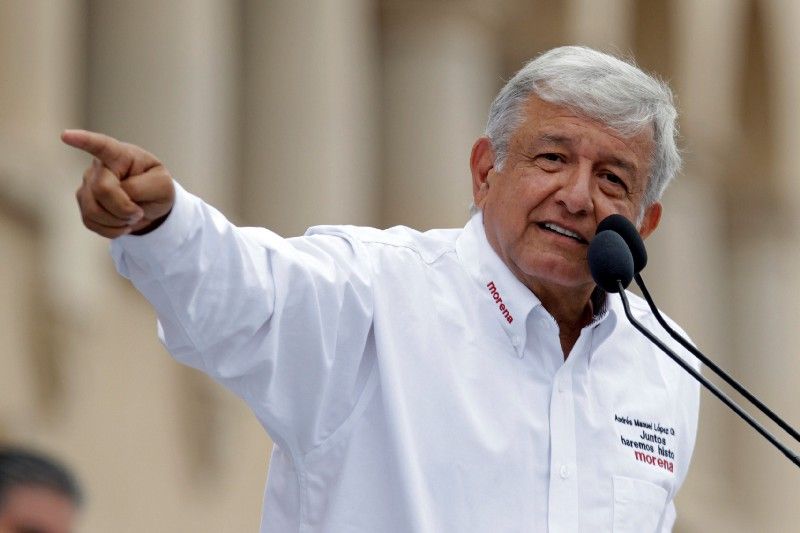June 29, 2018
On Sunday, Mexican voters will elect Andres Manuel Lopez Obrador, widely known as AMLO, as their next president. Mexico will have a new leader, Latin America will have a new voice, and Donald Trump will have a new foil.
Who is AMLO?
“Friend of the working man”: Mexico’s first “leftist” president since the 1930s, this son of village shopkeepers knows his working-class audience. His support is strongest in the country’s poor rural south, a region he promises to revitalize, and in the progressive-leftist stronghold of Mexico City. Over the years, AMLO, 64, has cultivated an image as a modest, honest, hard-working public servant. That image, more than any policy proposal, defines his appeal.
The Capable Executive: As Mexico City’s mayor (2000–2006), AMLO built a reputation as a leader focused on results. He proved willing to work with political opponents to expand pension protections, build roads to ease traffic, and restore dilapidated downtown infrastructure.
The determined politician: This is AMLO’s third run for president. After losing in 2006 by less than one percent of the vote, he accused his opponent of fraud, and his supporters occupied the center of the capital for several months. In 2012, he lost again. He’s now finally on the verge of victory.
The pragmatist: Though he does want the State to dictate the role of public and private players in the economy, AMLO has worked hard to persuade Mexicans he’s not a Hugo Chavez-style radical ideologue. He rails against a corrupt political elite but says he won’t raise taxes or confiscate land.
Nor is he a Chavez-style firebrand. After Trump’s election, AMLO published a book called “Listen, Trump” which included a passage that compared Trump’s descriptions of Mexicans with Nazi descriptions of Jews. But aware that Mexico needs good relations with the US, he has since taken a more circumspect approach and has reportedly worked behind the scenes to build ties with Trump advisors. AMLO won’t be silent if Trump attacks, but he’s unlikely to fire the first shot.
The president: AMLO’s likely landslide will boost his coalition to a majority in the lower house of Mexico’s congress and sizeable delegation in its Senate. That’s enough to get some things done, but he’s unlikely to realize the highest hopes or deepest fears that his career and campaign have aroused.
In particular:
- On fighting inequality, he promises free education and guaranteed jobs for the young, more generous pensions for the elderly, and lower taxes for Mexican companies — all paid for, he says, by ending corruption.
- On NAFTA, he’ll delay progress by appointing a new negotiating team, but economic necessity and political self-interest ensure he’ll want a deal.
- On corruption, be skeptical that AMLO, or anyone else, can take on the broad cross-section of Mexico’s political and business elite necessary to make a meaningful near-term difference.
- On violent crime, AMLO is simply overmatched. During this election campaign, the most violent in Mexico’s history, more than 120 politicians have been murdered, the national homicide rate has hit record levels, and violence has spread to new areas. Drug cartels have coopted local governments and police. In response, AMLO offers vague promises about a renewed Security Ministry, a national advisory council, an amnesty program for small-fry drug dealers, greater investment in education, and opportunities created by a stronger economy.
The bottom-line: A candidate can hope to be all things to enough people. Elected leaders must deliver. AMLO’s honeymoon may prove shorter than he expected.
More For You
Mastercard Economic Institute's Outlook 2026 explores the forces redefining global business. Tariffs, technology, and transformation define an adaptive economy for the year ahead. Expect moderate growth amid easing inflation, evolving fiscal policies, and rapid AI adoption, driving productivity. Digital transformation for SMEs and shifts in trade and consumer behavior will shape strategies worldwide. Stay ahead with insights to help navigate complexity and seize emerging opportunities. Learn more here.
Most Popular
- YouTube
Despite a ceasefire in Gaza, Israel is still not letting foreign journalists in to independently verify what’s happening on the ground, CNN’s Clarissa Ward tells Ian Bremmer on GZERO World.
- YouTube
On Ask Ian, Ian Bremmer breaks down the steady escalation of US pressure on Venezuela and why direct military action is now a real possibility.
US President Donald Trump arrives to announce reciprocal tariffs against US trading partners in the Rose Garden of the White House in Washington, DC, USA, on April 2, 2025.
POOL via CNP/INSTARimages.com
From civil conflicts to trade wars to the rise of new technologies, GZERO runs through the stories that have shaped this year in geopolitics.
© 2025 GZERO Media. All Rights Reserved | A Eurasia Group media company.
